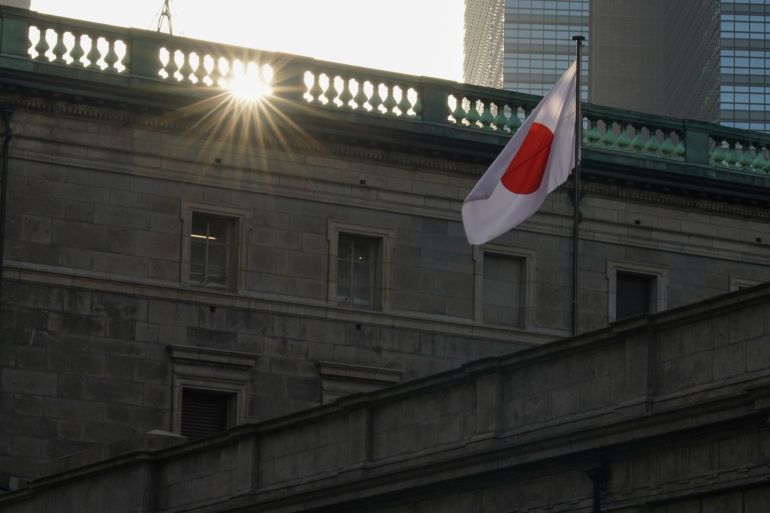Frugal Japanese tighten their belts as prices rise, yen slides
Tokyo, Japan – Tatsuya Yonekura has not raised the prices at his Tokyo cafe since it opened three years ago. But as Japan’s inflation rises and the yen languishes at a 20-year low against the dollar, Yonekura may be left with no other choice.
“I might have to raise the price of alcohol because the distributors are paying more money to import it,” he told Al Jazeera. “It is a difficult situation, I’m worried that people will stop coming if they have to pay more.”
The cafe owner’s dilemma comes as more Japanese are practising kakeibo, an approach to budgeting that translates as “household financial ledger”, or otherwise cutting back on spending.
Japan’s household spending fell in March for the first time in three months, declining 2.3 percent from the previous year, as rising prices and the weakening currency prompted the country’s famously frugal citizens to tighten their belts more.
Japan’s consumer prices rose 2.5 percent year-on-year in April, fuelled by inflationary pressures including the Ukraine war, surpassing the 2 percent target long aimed at by the Bank of Japan (BOJ). While inflation remains low by international standards, Japanese consumers are famously sensitive to rising prices after decades of economic stagnation that followed the collapse of an asset price bubble in the early 1990s.
Naomi Yakushiji, who recently left her salaried job at a cooking school to pursue freelance writing, said she planned to cut back on her spending after already committing to eating foods that are in season and therefore cheaper, a practice known as shun.
“The current economic climate definitely makes it that little bit more daunting,” the 29-year-old Tokyo resident told Al Jazeera.
“[Due to Covid-19] I think we have all had to learn to tighten our purse strings,” she said. “I have also massively reduced my spending on luxuries, such as clothes, jewellery, salons and recreational activities … I will not spend as much money on these things as I did before.”
Yakushiji has plans to move to Ireland at the end of the year, adding to her financial concerns. The yen has slumped to nearly 138 to the euro, down from 125 in March.
“I am very much considering leaving my account open in Japan and leaving money here with hopes that the situation improves,” she said.
Negative sentiment
John Beirne, vice chair of research at the Asian Development Bank Institute, said the yen’s rapid slide has stoked market uncertainty and negative sentiment.
“While the depreciation is positive for exporters, it could potentially weigh on consumer demand if imported inflation via higher energy prices curtails spending,” Beirne told Al Jazeera.
Last month, a survey of 105 major food and beverage companies carried out by Teikoku Databank found that the cost of 6,100 popular foodstuffs would increase by an average of 11 percent this year.
Processed food items, often viewed as a penny-pinching alternative to fresh produce, accounted for almost half of the predicted cost increases, with prices of cooking oil, bread, meat, cheese, ham and spices and toilet paper also expected to climb. The research group pointed to Russia’s war in Ukraine as the “main culprit” for the rising prices.
In April, Japan banned imports of 38 products from Russia, although trade ministry officials said the move would have little effect on the Japanese economy due to the existence of alternative supply routes.
Japan has also banned imports of Russian coal and pledged to phase out Russian oil, which last year accounted for 4 percent and 11 percent, respectively, of the country’s supplies. Tokyo also sources 9 percent of its liquefied natural gas (LNG) from Russia.
Energy prices, which were already on the increase, are now rising even faster. Seven of Japan’s 10 major energy providers raised household energy prices last month. Among them, the number one player, TEPCO, increased its rates by an average of 115 yen compared with the previous month.
New homebuyers are also getting hit. The average price of a home in the Tokyo metropolitan area in 2021 reached 43.3 million yen, the highest figure since 2014, according to a survey conducted by Recruit. The average mortgage last year also surpassed 40 million yen ($307,000) for the first time.
Not all economists, however, see Japan’s rising cost pressures as bad news.
Jesper Koll, a Tokyo-based economist and expert director of Monex Group, said he believes Japan has hit an “economic sweet spot” with demand surpassing supply for the first time in a generation.
“The fact that retailers and producers are actually passing on higher input costs tells you they trust consumers will bear and accept price hikes,” Koll told Al Jazeera. “In my view, chances are good the newfound confidence in pricing power will actually stick because the metabolism of Japan’s domestic demand has fundamentally changed for the better.”

While some economists argue the BOJ’s insistence on maintaining low-interest rates to spur consumption, especially as central banks around the world tighten policy, Koll believes Japan’s economy could be about to enter a “virtuous cycle” where rising prices do not reduce consumption.
“[BOJ Governor] Kuroda’s reputation and legacy is on the line,” Koll said. “He has nothing to lose by staying on the accelerator for longer until we can be certain Japan has hit escape velocity; escape from the one-generation deflation trap it was in since the collapse of the bubble economy.”
Japan’s relatively low wages are part of the complex dynamic. Japan’s average wage rose to $38,400 in 1997 but has remained effectively stagnant since then – whereas the current OECD average, after decades of steady growth, is close to $50,000.
Since Japan’s asset price bubble burst in the early 1990s, companies have eschewed mass hiring and raising salaries.
Compounding Japan’s economic stagnation has been one of the world’s most rapidly greying populations.
The proportion of citizens aged below 14 fell for a 41st year straight in 2021, hitting a record low of 14.65 million. Meanwhile, a third of the population is projected to be above 65 by 2050, with deleterious effects on productivity.
Beirne, the Asian Development Bank Institute economist, said more Japanese firms could soon have to pass on price increases to customers if the cost pressures continue to rise.
“This may also help to stimulate aggregate demand,” he said. “[Which] would then make wage rises more feasible for Japanese firms.”
For Japanese like Yakushiji, the hope is that rising prices mark the beginning of a long-awaited economic revival.
“These times have definitely forced us to cut back on our discretionary spending and it will be interesting to see how the country will recover economically in light of this,” she said.



